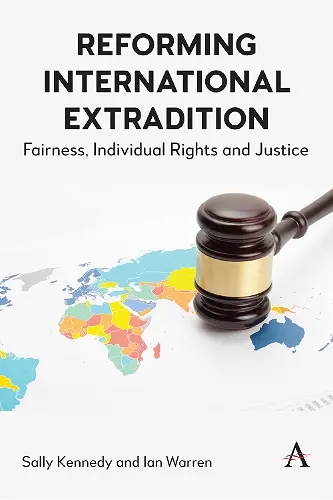Reforming International Extradition
Fairness, Individual Rights and Justice
Ian Warren author Sally Kennedy author
Format:Paperback
Publisher:Anthem Press
Published:3rd Sep '24
Should be back in stock very soon

Uses several case studies to demonstrate key problems with the international extradition process, and possible reforms to improve its operation.
Extradition often priorities international comity and state rights over individual protections. This can create unfairness and concerns about extraditee welfare. Using case studies, this book explores these issues and argues that defendant-centered reforms are needed to adjust these unequal levels of authority.
This book uses several case studies to demonstrate current problems with international extradition. These include political issues, time delays, jurisdictional problems, and conflict between surrender and the human rights of extraditees. The normative assumptions underpinning extradition ensure these procedures are more likely to prioritise international comity between nation states, rather than individual human rights protections. This creates a system with limited judicial relief for extraditees that require extensive proof of high human rights thresholds, as well as a prominent rule of non-inquiry, restrictive evidence regulations, and deference to the executive. The book argues that a defendant-centred approach to extradition reform is needed that prioritises a right to fairness as a core value for promoting global justice. This includes considering changes to enable greater post-extradition monitoring of extradited people and broadening rules for extraditees to submit evidence to support a claim against surrender. New and more viable extradition alternatives also involve transferring evidence to shift the trial to the location where most of the offending activity occurred and sentencing in the extraditee’s home jurisdiction. These proposals aim to counter the current unequal levels of authority that favour the power of both the requesting and requested state over the rights of the individual.
“A welcome addition to the literature, Kennedy and Warren’s book uses case studies to cogently support the reform of extradition in order to counteract egregious foreign criminal prosecutions and protect individual rights and justice.” —Paul Arnell, University Aberdeen, UK.
“Sally Kennedy and Ian Warren provide a brilliant in-depth critical analysis of the current global state of international extradition, challenging the normative assumptions of extradition law, and offering a radical calling for a defendant-centred approach that reprioritises human rights and due process protections for extraditees. This is a gem of a resource for policy reformation that can transform current extradition processes to achieve fairness and justice.” —Dawn L. Rothe, Professor, School of Criminology and Criminal Justice, Florida Atlantic University, USA.
This is a work of great originality. Based on the premise that the current state of extradition law is not suited for the modern reality of globalisation the authors explore with faultless clarity the potential for reform. A book of great interest to academics, criminal justice practitioners, lawand policy-makers. —Saskia Hufnagel, Reader in Criminal Law, School of Law, Queen Mary University of London, UK.
ISBN: 9781839989575
Dimensions: 229mm x 153mm x 7mm
Weight: 454g
114 pages